Dream retold for the silver screen
Movie trilogy brings one of China's most well-known and beloved mythological stories to life, Xu Fan reports.
Over the span of a decade, film director Wuershan — who recently celebrated his 51st birthday — has steadfastly devoted himself to a singular pursuit: training his actors and helming the Creation of the Gods trilogy.
To better visualize the fantastic world portrayed in the mythological tales, Wuershan visited New Zealand to meet with director Peter Jackson, and learned from his experience directing The Lord of the Rings trilogy.
"Jackson said he felt exhausted most days. We benefited from his experience and drew up the schedule more scientifically, which helped me avoid feeling overly tired. I even managed to lose weight and stay fit during the shooting", said Wuershan during a recent interview.
With a huge budget, the trilogy began its preparation in 2014. It took nearly five years to write the scripts for the three movies, which were filmed over nearly 350 consecutive days. The crew consisted of 8,000 members and there is a stellar cast including Chinese American actor Kris Phillip, better known domestically by his Chinese name Fei Xiang, veterans Huang Bo and Li Xuejian, as well as actress Yuan Quan.
As the tales also feature a group of young princes who possess exceptional martial arts skills, the director selected almost 30 young actors, most of whom had not previously performed in a movie, from a pool of 15,000 applicants, honing their acting chops as well as skills, such as horse-riding and archery.
Naran depicts the crucial role of Daji — a fox demon who disguises herself as a stunning beauty. To help the actress vividly portray her character, which combines the traits of both animals and humans, Wuershan requested that she regularly visit a zoo and closely observe the behavior of foxes. Additionally, the director assigned her the task of noting down her observations in diaries and reporting them.
Now, audiences can judge for themselves the fruits of the filmmaker's efforts. The first installment of the franchise, Creation of the Gods I: Kingdom of Storms, has been drawing Chinese movie lovers to cinemas nationwide since its release on July 20, becoming one of the biggest summer blockbusters.
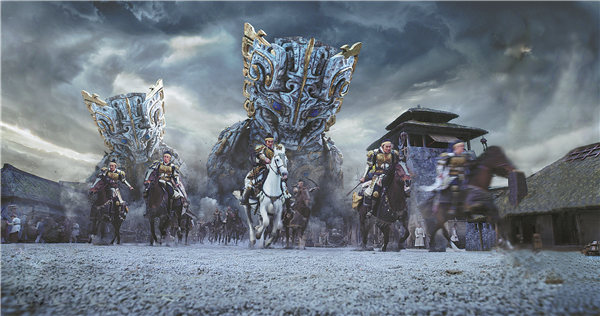
Focus on the human
Creation of the Gods tells the story of a notorious tyrant and his overthrow by an army of justice approximately 3,000 years ago. The trilogy once again brings to life the legends of Fengshen Yanyi (The Investiture of the Gods), a Ming Dynasty (1368-1644) novel that has spawned popular TV series and animated works.
The ancient novel, spanning 100 chapters, blends historical records with mythology, transporting readers into a fantastic world where humans, celestial beings and monsters co-exist.
In the original story, a household tale for many Chinese, the tyrant King Zhou becomes captivated by Daji, the fox demon which takes possession of a beautiful woman's body. The cunning creature entices the ruler into indulging in debauchery, abusing his power and mercilessly slaughtering innocent people.
Ji Fa, a prince of a subordinate territory, rises in rebellion, leading the armies of his territory to resist the tyrant.
As immortals join the two conflicting sides — with some supporting King Zhou, believing him to be the heaven-chosen ruler, while others standing with Ji, seeing him as the savior of the suffering people — the war becomes prolonged and relentless.
During the war, many figures emerge, some of whom become widely recognized heroes. Among them are Jiang Ziya, a wise sage whose talent is discovered in his 70s, Yang Jian, a superhero with a third eye on his forehead, and Nezha, who possesses flaming wheels beneath his feet. Some of these iconic mythological figures are featured in the movie, with the character Jiang played by actor Huang Bo.
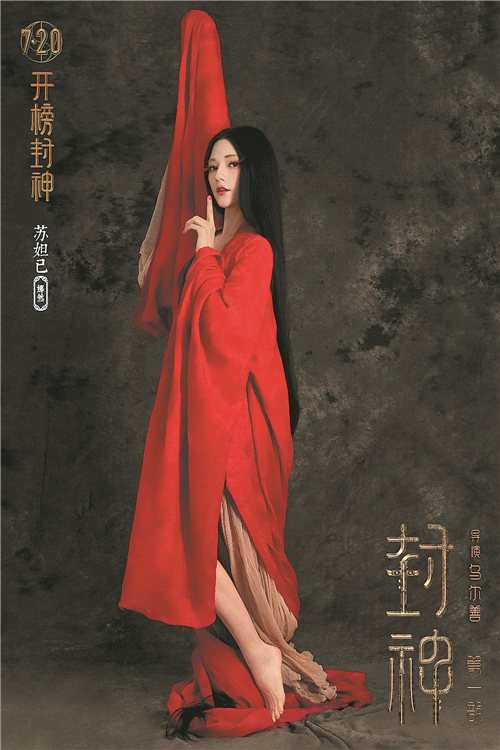
A native of the Inner Mongolian autonomous region, Wuershan reminisces about his initial encounters with the Fengshen Yanyi tales in comic books.
As time went on, he delved deeper into the stories by immersing himself in the Ming Dynasty novel, Western Han Dynasty (206 BC-AD 24) historian Sima Qian's Shiji (Records of the Grand Historian) and Wuwang Fazhou Pinghua (King Wu Resists King Zhou), a popular fiction thought to have been created during the Song (960-1279) and Yuan (1271-1368) dynasties.
Wuershan says, "Researching deeper and further, I have always asked myself: Why do generation after generation of Chinese people willingly share and pass on these legends?"
What has captivated the director most is not the conflicts and battles between the super-powered fighters. Instead, it is the relationships within two royal families — King Zhou's family and Ji's family (Ji is later crowned King Wu) — that have ignited his imagination. In the original novel Fengshen Yanyi, King Zhou is portrayed as a merciless tyrant who inflicts torment upon his wife, Queen Jiang, goes as far as digging out his uncle's heart, and orders the execution of his two sons. His cruel actions are driven by his obsession with Daji's beauty.
"The novel was written around 500 years ago, and the values of that time were completely different from those of today. I believe that the stereotypical views often portrayed in ancient novels, where male rulers shift the blame for their own brutality onto beautiful women driven by ambition, are unreasonable," says Wuershan.
"In the movie, we have made changes to make these well-known plot points more reasonable and logical," he adds.
The first installment revolves around King Zhou's ambition and the tension that arises between him and a group of young princes, who are sent to his court by their respective fathers, all rulers of subsidiary territories, as a way to demonstrate loyalty to the king.
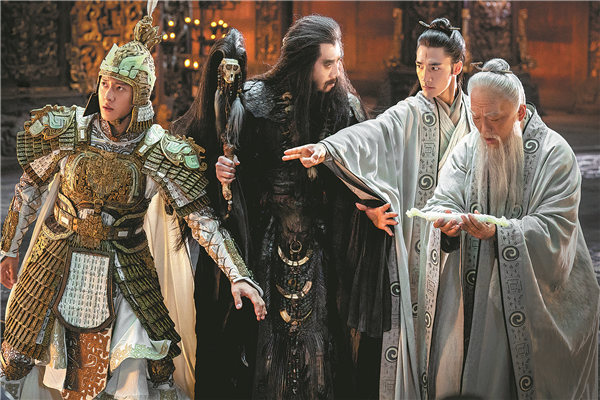
Myth-making continuity
Wuershan studied oil painting at the Central Academy of Fine Arts, before graduating from the directing department of the Beijing Film Academy. Despite not being a prolific director — he had only three feature-length movies under his belt prior to the Creation of the Gods franchise — he is renowned for his unique aesthetics and cinematic language.
Explaining his interest in shooting the trilogy, the director says: "Since I was young, I have been passionate about Chinese history, mythology and traditional art. After delving into a comprehensive study of Chinese and global art history, I have found that there are certain elements of aesthetics that remain consistent throughout the evolution of a nation. Mythological epic films, to some extent, serve as a medium to reflect this continuity."
Currently, all the scenes of the trilogy have wrapped up their final shooting, and the two sequels are in post-production.
The director — who is also helming two other projects, including one about the legendary Ming Dynasty mariner Zheng He — says that he hopes audiences will accept his adaptation and be willing to follow how characters' destinies unfold over the next two installments.
During the interview, the director referenced the famous quote by the American writer Joseph Campbell, stating that "myths are public dreams". However, it appears that the director's aspiration to pursue his personal dream probably depends on the market's response.
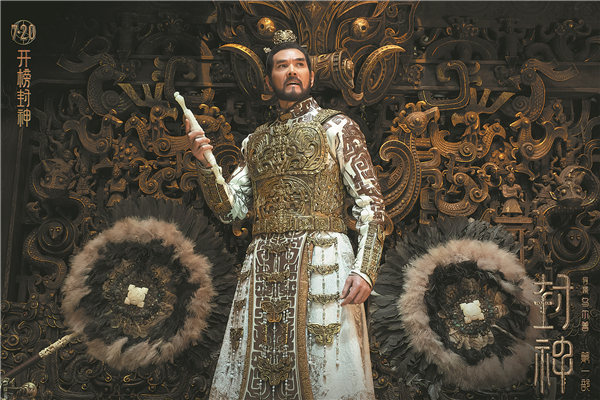
Related articles
-
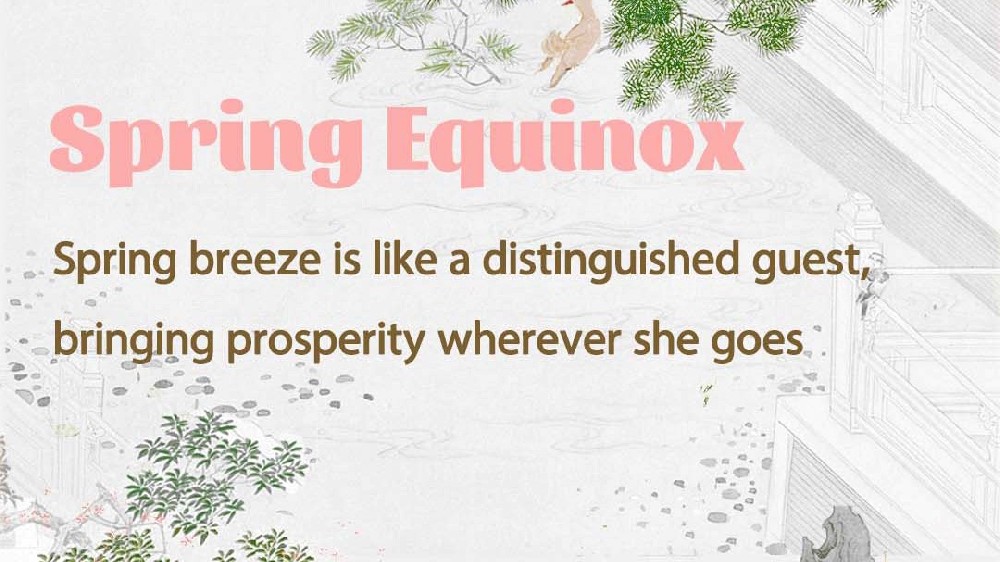 Imax China executives upbeat on China's record-breaking success
Imax China executives upbeat on China's record-breaking successMore
-
 Timeless myths and old-fashioned marketing
Timeless myths and old-fashioned marketingMore
-
 China's film market kicks off 2024 with record Spring Festival sales
China's film market kicks off 2024 with record Spring Festival salesMore
-
 A blast from the past
A blast from the pastMore
-
 Discoveries enhancing our story
Discoveries enhancing our storyMore
-
 Chinese kung fu dance drama wows international audience
Chinese kung fu dance drama wows international audienceMore
